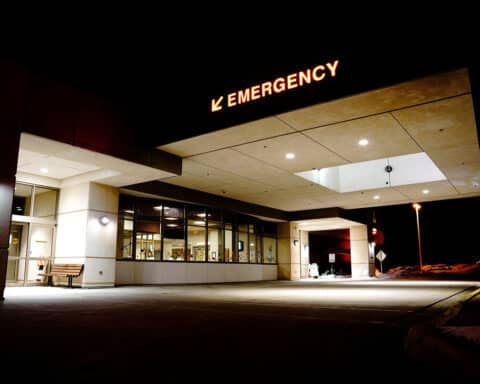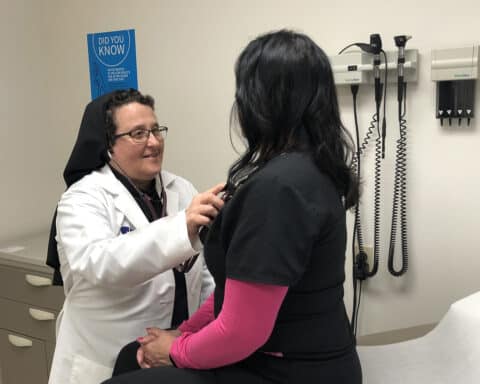Two major Catholic colleges are building on-campus schools to teach the most modern technology, ages-old philosophy and 21st-century skills in one of the oldest professions in the world: nursing.
Providence College in Rhode Island plans a massive five-story, 100,00-square-foot building with state-of-the-art health and sciences programs integrated with liberal arts education in the Catholic and Dominican tradition. A dormitory building that was converted from an early 20th-century hospital will be razed to make way for the college’s first new school of study in 100 years. The school is up and running as of this fall, and the first nursing students are expected to arrive in the fall of 2023.
The Catholic University of America in Washington, D.C., will build the new Conway School of Nursing and Sciences in 2024. It will encompass 102,000-square feet on the campus near the Basilica of the National Shrine of the Immaculate Conception in northeast Washington. The new building will enable the Conway School to double enrollment and increase the size of its faculty.
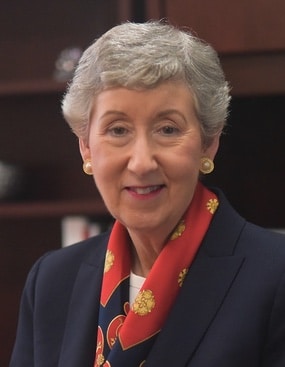
“We need a national call; we need people to feel called to nursing,” Conway Nursing School Dean Marie Nolan told Our Sunday Visitor. To amend the call for recruits by the U.S. Marine Corps, Nolan is “looking for a few good men and women” as students and faculty.
“We are looking for good Christian faculty members who are attracted to the Catholic-Christian tradition of health care and nursing,” said Nolan, who is filling 10 teaching positions — five now and five more over the ensuing months.
“Many of those students coming into nursing are Catholics, and a lot of students who are not Catholic coming to our nursing program are introduced to our wonderful faith and our belief that Catholic nurses take care of the whole person — mind, body and soul; not just the wound but the whole person.”
Both schools see their programs not only filling the shortage of nurses nationwide and overseas, but providing care from the Christian perspective of treating the whole person that author Charles Camosy encourages in his recent book, “Bioethics for Nurses: A Christian Moral Vision” (Eerdmans, $21.99).
“There is a practical need to fill lots of nursing vacancies in hospitals — and especially Catholic hospitals. This is particularly the case in geriatrics and nursing-home care, where there is so much turnover, so much hard work necessary and so much great need,” Camosy told Our Sunday Visitor.
“Beyond that practical aspect, however, it’s hard to imagine a profession that fits so well with Catholicism. The kind of healer that does far more than parachute in and order up a new round of meds; nurses stay by the bedside and get to know the patient and family and are able to treat the patient in something close to the fullness of who they are. That is, like Christ, the great healer.”
Saintly inspiration
In the nomenclature of business, the schools found “full buy-in” on campus, in their respective cities and in financial support for the two initiatives.
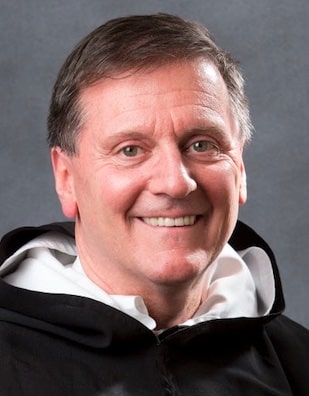
Father Kenneth R. Sicard, president of Providence College, told Our Sunday Visitor that building a nursing school at his alma mater has “been a dream of mine for a while.”
“We are going to be training nurses who are not just technicians but healers,” Father Sicard said. “We are inspired by the corporal works of mercy shared by the great Dominican, St. Catherine of Siena.”
The 14th-century Dominican often visited hospitals and homes where the poor and sick were found. Her activities quickly attracted followers who helped her in her mission to serve the poor and sick.
The Providence College board of trustees and its faculty senate unanimously approved the undertaking, Father Sicard said. The new school will see the introduction of two new degree programs at Providence: a bachelor of science in nursing and a bachelor of science in health sciences. Providence College’s existing bachelor of science in health policy and management will also become part of the new school.
The project will cost $70 million to develop, build and operate.
Providence will now begin accepting students for the two new degree programs for matriculation in the fall of 2023. Father Sicard said the new school will build upon the college’s existing academic program and faculty expertise, provide numerous opportunities for interdisciplinary collaboration and broaden the college’s reach and impact. The new school plans to move quickly into graduate-level programs.
Dr. Kyle McInnis, senior adviser to Father Sicard and the inaugural dean of the School Nursing at Providence College, told Our Sunday Visitor, “This is big and bold and a transformational new chapter of the college … and this has great implications for the state.”
“We can now collaborate in the promotion and advocacy of health care in Rhode Island. The first step we took was to reach out to health care providers at hospitals, health centers and long term care facilities.”
Well-earned tradition
Catholic University’s major benefactors for the project are Bill and Joanne Conway, who have donated $40 million to the school named in honor of their family. The Conways have donated $80 million to the university in the past decade.
“Our Conway School of Nursing has long been one of Catholic University’s most successful academic programs. I am thrilled that the school will now have the home it deserves,” said CUA President John Garvey in a press release that announced the project.
The new building will provide “modern educational facilities for nursing students, including multifunctional clinical learning and instructional support areas,” the release said. “New simulation labs will allow for training in high-stakes acute care and objective-structured clinical examination.”
Camosy, a professor at Fordham University, told Our Sunday Visitor that nursing has thrived by the involvement of Catholic training and practices.
“The Catholic Church has an incredible history of religious sisters doing the care that nurses do. In fact, religious sisters were the first nurses,” Camosy said. “They not only started the major hospitals in the United States, and were the only nurses available to serve during the Civil War; nurses like the Sisters of Mercy in Ireland were the ones who actually influenced Florence Nightingale, who is sometimes thought of as the founder of contemporary nursing. Again, there’s no profession which is more Catholic than nursing.”
Both Providence College and Catholic University offer collaboration between their nursing schools with hospitals and community health agencies in their respective regions of the country in addition to overseas opportunities.
Nolan said that a collaboration with Johns Hopkins University in nearby Baltimore will provide nursing students with a certificate of clinical ethics through its ethics team.
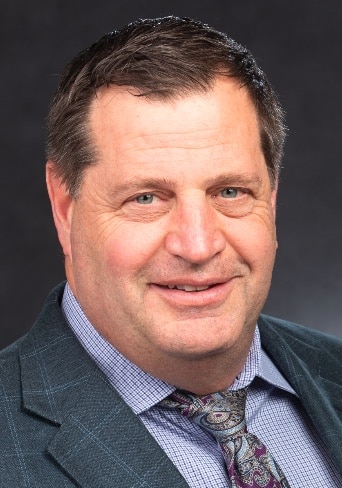
Providence’s new nursing school, according to McInnis, will promote community health, where most care outside the hospital is occurring in homes, health care centers, long term care and in schools. Telecare has emerged as a health care tool, and the school will provide a simulation laboratory in a home setting. Clinical mental health services from youth through elder care will also be pursued through a holistically body, mind and spirit approach.
Health policy and management and public health education will include short term study abroad through the Dominican community; the Department of World Languages and Culture will provide students with a Spanish language minor in health programs for health professionals that will equip them to work in the area community and abroad.
Catholic nursing schools have a well-earned tradition of getting to the heart of the matter, Camosy said.
“Obviously, health care professions stand at the boundaries of life and death, and focus on caring for people who are by definition very vulnerable, sometimes unimaginably vulnerable. Therefore, the fullness of the Church’s teaching, particularly on a consistent life ethic, is absolutely central for doing health care well,” Camosy said.
“This is especially true at a time when secularized medicine really struggles to even articulate what it is at all,” he added. “Sometimes, I refer to this as the Burger King version of medicine, where everyone gets it their way as any other transaction in the marketplace. Catholic health care, by contrast, knows what it is, as it’s been doing it for millennia.”
Joseph R. LaPlante writes from Rhode Island.


